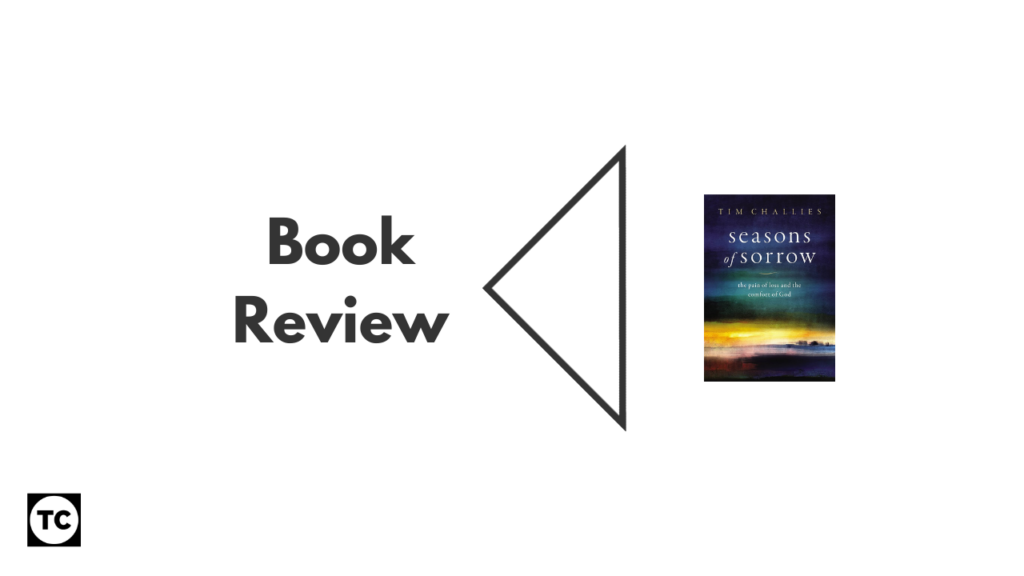
Books about grief and pain are quite a valuable resource – yet so many fall short in different ways. They can be cold – lacking a human emotional touch that renders them unhelpful for those living in sorrow. They can be kitcsh or cheesy – lacking depth and any meaningful words of comfort – or they can be over-theoretical and disconnected.
Tim Challies’ Seasons of Sorrow is the book I will now recommend if someone wants a book on grief. He writes brutally movingly about the unexpected death of his oldest son – through 42 short chapters, separated out by the seasons of the year. In one level, this book is in part a heavily edited series of blogs covering the first year since Tim lost Nick. But that description does the book a deep disservice. Parts of it may have started that way – and certain sections hold the raw, unfiltered ‘vibe’ of online writing – but the coherent whole covers the ebb and flow of emotion familiar to those who have lost loved ones, with perhaps particular poignancy for fathers who have lost sons.
I am a father – Lord willing, not one who will live through the loss of a child. The most recent significant death in my life was that of my grandmother – a kind of grief tempered by the normal pattern of life. Tim’s writing spoke to that grief, because he is rooted and grounded in a firm and unshakeable biblical faith in God. The next most recent was one that was a shock – the unexpected loss of a good friend (a husband, father, and pastor – a good man who had he lived would shortly have become a beloved grandfather and father in law). Seasons of Sorrow spoke to me about that grief in a deep way – the unexpected loss of death is one thing, it is quite another to have someone’s absence notable at major life events. I was glad that my friend knew my wife and I had had our first daughter – she was a jarringly glorious reminder of life at his thanksgiving service – but I feel almost guilty that his own son’s first son never met his grandfather. Seasons of Sorrow spoke to me – as someone who lost a friend, and feels the pang of those who lost more – and spoke in a way that wasn’t trite, wasn’t forced, but was raw and real.
In one particular moving chapter, ‘how long is the dash?’, Tim describes the length of the dash between dates on a headstone. A sort of almost humour is injected – “Had old Methusaleh been buried under a headstone here, perhaps his dash would span several feet across an absurdly elongated monument” (p.98) – and yet Tim’s writing dances the idea into a helpful reflection on the nature of eternity. Even the humdrum architecture of grief can point to something more, in the hands (or, rather, fingers on a keyboard) of a good writer. Later on – and this book has a number of resonances and references with those who have grieved before – Tim writes about the historical reality of the death of children: “It is only in the most modern of times and the most privileged of nations that the death of children takes us by surprise and strikes us as unusual. Spurgeon is exactly right when he says that the singularity of sorrow is but a dream of the one who suffers. A host of precious brothers and sisters can sympathize with my loss, for the have suffered it themselves. Their suffering has equipped them to commiserate, to comfort me in my sorrow. I feel them drawing alongside me. I do not walk alone.” (p. 127-8). Some words from the Epilogue capture the complex mixture of sorrow and hints of hope – “every joy is tempered by sorrow, every moment of rest by the knowledge that the work must still go on. The purest joy and fullest rest always lie beyond time’s horizon” (p. 193).
It’s difficult to review a book this personal – so I will close by saying that I recommend it to you if you are dwelling in or with grief, because Tim speaks of and too something even deeper. It is simultaneously a painful book to read, and a privilege to read beyond. This book will haunt me for a while, I think, and the hope and reality it points to is good nourishment for the wounded soul.
5/5
Leave a Reply